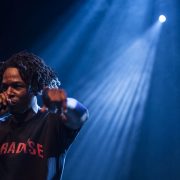By Ali Shaheed Muhammad and Frannie Kelley
Terrace Martin takes his job very seriously. Here’s just a taste of what he sees as at stake when he goes to work: “You got the Marines. You got the Army. We are the only people that soothe them. The art community are the only people that soothe the people that violently defend us cause they have to sometime, or sometime they don’t, but regardless we are the only community that defends them.”
This conversation, our second with Terrace, got heavy, even teary. It was always going to, and we taped only two days after Phife passed. All these words came out of a too-tired-and-sad-to-be-false period of time, which isn’t to say that they aren’t leavened by Puffy stories and suspect relationship advice.
ALI SHAHEED MUHAMMAD: Terrace Martin in the building.
FRANNIE KELLEY: Part two.
MUHAMMAD: Part two.
TERRACE MARTIN: Part two, man. The sequel.
MUHAMMAD: It’s happening, when we have return guests.
MARTIN: I love that, yeah.
MUHAMMAD: I’m like, “Oh, yeah. We official. We growing.”
MARTIN: I’m almost there, baby.
MUHAMMAD: No, you there.
MARTIN: I’m there. I’m here.
MUHAMMAD: Actually, you’re making us official.
MARTIN: S***. Shoot. Can I cuss on this?
MUHAMMAD: Yup.
KELLEY: Yeah. It’s fine.
MARTIN: I’m going to still not cuss. That’s my new thing, try not to f****** cuss so much.
MUHAMMAD: How you doing?
MARTIN: Cool, man. I’m happy, man.
MUHAMMAD: That’s important.
MARTIN: I’m happy.
MUHAMMAD: A lot of people might not be able to say that readily. Why are you happy?
MARTIN: I’m happy because, no matter, what I’ll always go under the understanding of: you could find beauty in every problem, and every day you wake up it’s always going to be problems. And this is not even no — this is not no deep miracle, spiritual s***. This is just really how I really feel. It’s beauty in every problem, and when I was younger, I could never accept challenges. I would turn away from challenges, life challenges, this, and that.
And then I realized that these challenges will never go nowhere in your f****** life. Challenge will always be here, so you have to press through every challenge. And I know every day is going to wake up; it’s going to be some form of challenge, but now I’m excited for every challenge. I’m excited for every challenge, every obstacle. I’m not even talking about in music; I’m talking about in life. None of my conversations are really on music now anyway.
But every obstacle that I encounter, I feel like once I go through it — cause I’ma make it through all of them — so once I go through the obstacle and I make it through, it’s like my own spiritual trophy. So I actually get up and I look forward to what may be the obstacle, cause whatever it is I’m gonna conquer it.
So that’s when I say I’m happy, that means I don’t live in fear. I don’t live in disbelief. I understand faith. I understand you have to lose faith to gain faith and to really understand faith. So that’s why I’m happy. Cause I understand those Earth, Wind & Fire-type things in my life right now. And I didn’t always use to understand that s***.
MUHAMMAD: What became the eye-opener for you to begin to see life that way?
MARTIN: When I started — when I realized this — cause I was young growing up in this record business. What started me — those things — I started opening my eyes about five or six years ago when things wasn’t that moving, as far as in Los Angeles with the hip-hop scene and certain — it was just another scene that I wasn’t versed at that was going on.
And sometime when — sometime in music when you don’t — it’s a psychological thing that happens cause in music, especially — unfortunately in a lot of things — but hip-hop music now, and I believe the past 15 years, some people — it became a thing to where it was OK to sound like everybody else and be like everybody else and look like everybody else. But all of my heroes and all of my teachers told me on records that I had to be different. So at the time, when I finally got good enough to be different, it was popular to sound like everybody else. And that was puzzling to me just in music in general, cause I don’t believe — I believe you should be yourself.
So it was a dark time business-wise for me and a lot of my friends in Los Angeles on the music scene to where we wasn’t working. Nobody was calling us to produce the records, to do the records, or record labels wasn’t calling. It was just a strong thing that was like a black cloud, I felt like, over Los Angeles, that — it really helped me get closer back to my saxophone. Cause I’ve always been a saxophone player, but when the records wasn’t going on, I had to play my horn really to make a real living again.
And through that is where I found out that — I realized what loyalty was, cause I had been disloyal really to the art. And I fell in love with kind of what it was supposed to be about, and that’s how I got lost in transition. That’s how all of us got lost in transition though. It was like a plague of some f***** up s*** going on in the music business. Just something was going on. But it —
KELLEY: Wait. So what was happening then? 2010.
MARTIN: They just —
KELLEY: Like music — what was popular? I can’t remember.
MARTIN: Music is always inspired by life, what goes on around.
KELLEY: For sure.
MARTIN: You know what I’m saying? I think a lot of just back then, it was just — I think it was going through a growing spurt. A growing thing. And that’s just what I — now that I’m older and I look back, I think it was that, and — I just think it was that.
But going through that dark time and not being called, not getting the phone answered or this and that, then I realized once it was just me alone in the room with my art, with my music, and I realized like, “You know what? Let me stop complaining about everything, cause at least I have my health and I’m able to get up in the morning. Play the horn, and I could still listen to music and then I’m just going to keep practicing everyday and stay loyal to the sound I want to do. And one day, something’s going to happen.”
MUHAMMAD: That’s a very —
MARTIN: And then that little m*********** from Compton came out, Kendrick Lamar.
MUHAMMAD: Well, I was gonna ask about him.
MARTIN: What happened?
MUHAMMAD: Since you brought him up, I was like — well, some people may take that and say, “Well, things got a little bit better. Maybe that’s why you can see things, life, from a brighter perspective.” But —
MARTIN: But.
MUHAMMAD: But before we go there, in that sort of adversity, in having to look at life through a different lens because you’re now focused on yourself, focused on your relationship with your horn, focused on seeing life from a different perspective, it’s very freeing. And it may be difficult for people who are not there yet to really see how free it is. So in other areas of your life, if that’s how you looking, how does it then begin to pay off for you?
What I’m asking is that, now that you have a new understanding, a new vision, an outlook on life —
MARTIN: OK.
MUHAMMAD: — and how you’re treating just life in general when you wake up, how does it then, that transformation, begin to pay off for you? Like, you’re seeing, I guess, the fruits of that growth.
MARTIN: Because it — now that I understand. It’s — I’ve learned how to live alone now. Like, I’ve learned how to sleep alone now. Same thing with a relationship. I’ve learned how to be alone, because I had to be alone, you know what I’m saying? There was nobody to call or — and what I mean nobody to call, I mean it was — and when I mean me, it was — it’s a few of us. But me in general, I had to learn how to be confident and happy with the blessings I have around me and the people that I have around me and the facility that the creator has giving me to be able to move how I move, in general.
So I think once I really humbled myself within myself, things start turning around. So it’s paid off, because I’ve learned how to be alone. I’ve been stripped down of everything to be made whole again, to build back up again. You know what I’m saying? So now my values are different, my morals are just totally different, my foresight, I know my job. My job is only to be a servant of the community, and just to inspire. That’s it. That’s my whole job, and I know that.
That’s why certain things don’t really get to me. Cause I’m grounded. I know what I have to do, and I know that we’re on a mission. I know this whole movement that we’re on, art, is on a mission. We’ve been told to do something by the forefathers before us, you know, P.E., Tribe Called Quest, N.W.A. Like, we’ve been set a manual. So we have a mission. We have a book that we’re following right now.
So that’s how it’s paid off, because I’ve stayed loyal and I believe your gift will make room for you if you just stay loyal and just stay put. So many people just get — right when you get frustrated like “Ah!” and then bam something cool could happen, you know what I’m saying? And I believe that’s what — that’s what those negative energies want to do. It’s like, they want to confuse you, and they want to steal your joy.
Cause once your joy is gone, it’s a wrap. Cause happiness is temporary; joy is everlasting. So once your joy is gone, damn, then they could f*** with your head, and once they f*** with your head, you just left on the side of the road.
MUHAMMAD: So with regards to the new record, Velvet Portraits, it definitely sounds — it sounds like a transformation, this record. I don’t know what it is. It’s something about it. It seems lighter and pleasant. I don’t know if that’s —
MARTIN: Yeah, it is.
MUHAMMAD: — deliberate, or if that’s just manifestation of where you are.
MARTIN: My art, most of my art, is — a lot of it, at least 75% of it since I could remember it, even when I used to draw pictures as a kid on canvases, most of my art sometime is always reflecting the opposite of what I’m seeing or what I’ve been through or what I’ve seen.
So you have some cases in hip-hop, the gangster rapper, some certain ones will talk about everything they’ve seen, everything they’ve been through, everything they’ve done. Then you have the gangster that don’t rap, that doesn’t talk about anything. Those are my heroes. And all they did was do things and they would soothe people in the neighborhood of the other guys that sometime would come in and disrupt the neighborhood.
Those are my — that was my earliest experience with the first formation of what kind of Africa was I read about, just in a different way, as a village and a community. So my heroes are people like that, that just stayed and made sure their family was taken care of.
So art-wise, my thing is like with all these crazy things going on — you have some people that literally talk about what’s going on. Like, you have “We gon’ be alright.” You have J. Cole. You have all these people. And MCs can just — bam — pinpoint it. So my thing is I didn’t want to do art like that, because that’s being done by greats right now. I’m — I don’t believe in — I believe in finding my corner and trying to fill that void to paint a different picture. So my thing is I want to do, musically, soothing music to soothe the times of what’s going on.
https://youtu.be/ZQTzVYHKj1U
Source:http://www.npr.org/sections/microphonecheck/2016/04/08/473407997/terrace-martin-i-believe-you-should-be-yourself
Video:www.youtube.com
Photo:https://sfjazz.org/onthecorner/terrace-martins-top-5-albums-2016











